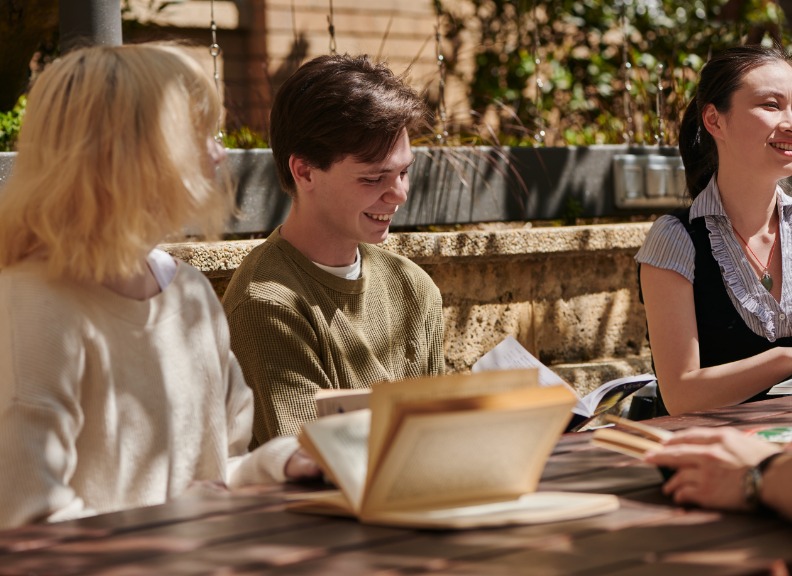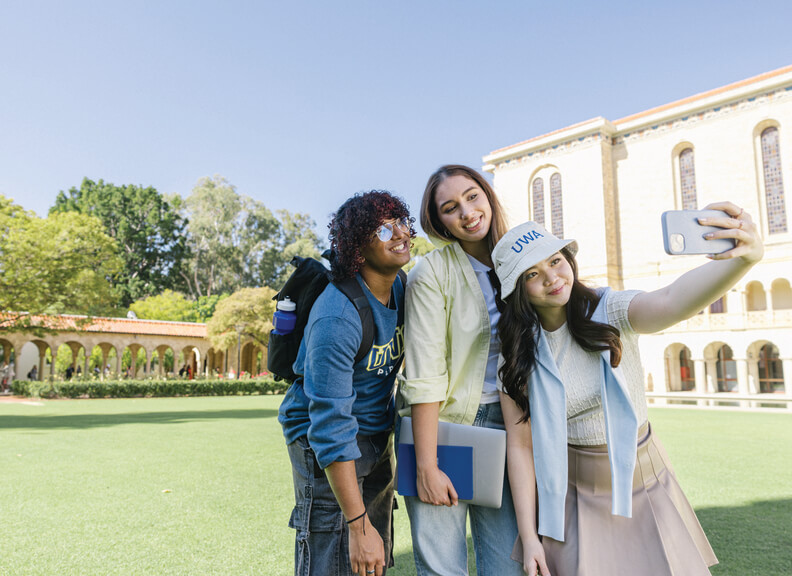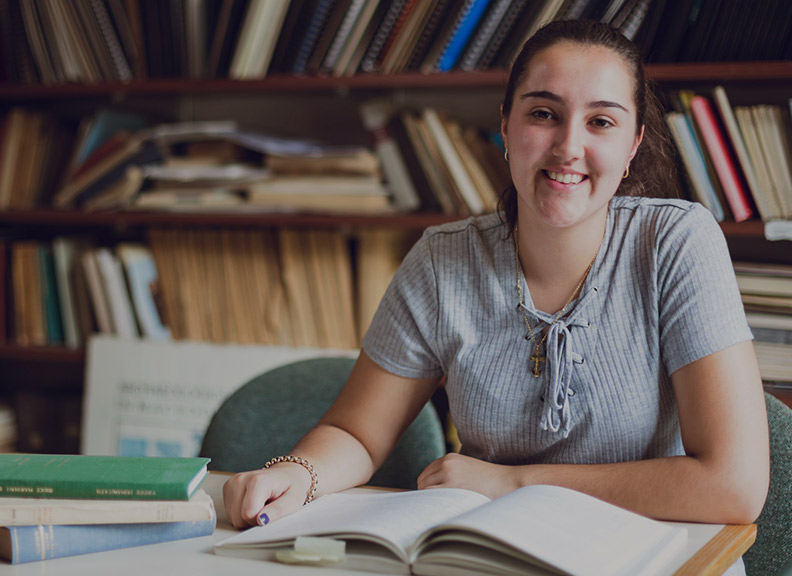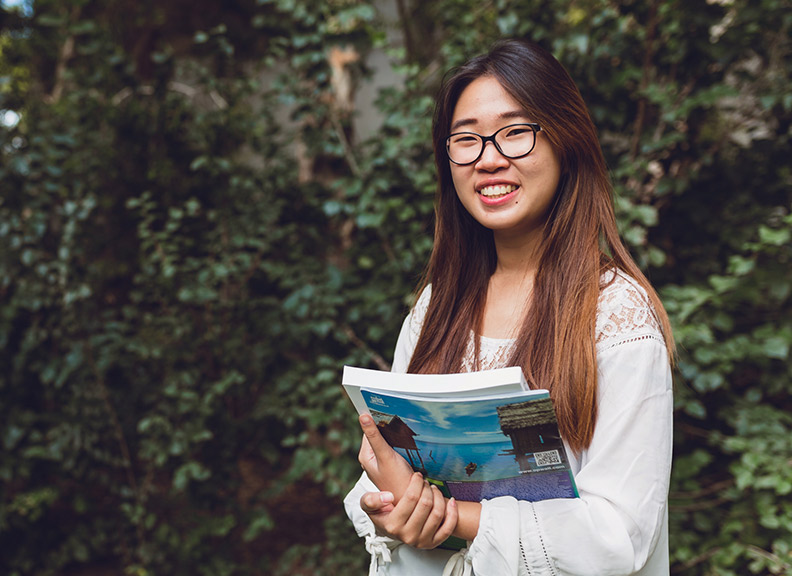Undergraduate
History
Contact us
Address
Student Central
The University of Western Australia (M355), 35 Stirling Highway, Perth, Western Australia 6009
Telephone
131 UWA (131 892)
International
(+61 8) 6488 1000
Hours
Frequently asked questions
Events you may be interested in
Show more eventsCareers and further study
This course opens up a world of future study pathways and career opportunities.
Career Pathways
As a History graduate, you can apply your skills in research, critical analysis, and written communication in a variety of fields. These may include historical research and writing, teaching, journalism, librarianship, archival management, government agencies, museums, cultural heritage and tourism, business administration, politics, and publishing.
Potential career paths include:
- Conservation Officer
- Archivist
- Teacher*
*Postgraduate study required
Further Study
Master of Strategic Communication
Fees and scholarships
Domestic Student Fees
For Commonwealth-supported places, student contribution amounts are charged by unit, based on area of study. For a fee estimate, go to the Fee Calculator and select “I want to price my units”. Fees are subject to annual indexation. Refer to the Handbook to identify the units required. More information on how fees are calculated.
Scholarships
Scholarships are available to students from a diverse range of backgrounds, including academic achievement, financial need, educational disadvantage, leadership and community service, artistic or sporting achievements, and being from a rural or remote area.
Cost of living
International Student Fees
Onshore international students are charged an annual course fee, charged per credit point at a rate dependent on the course in which the student is enrolled. Annual course fees are calculated based on an annual study load. Check the handbook to confirm the annual study load for your course.
Find out more about international student tuition fees and visit the fee calculator for the relevant course fees.
Fees are subject to annual indexation.
Scholarships
Scholarships are available to students from a diverse range of backgrounds, including academic achievement, financial need, educational disadvantage, leadership and community service, artistic or sporting achievements, and being from a rural or remote area.
Cost of living
Admission requirements
The University of Western Australia welcomes applications from international and domestic school-leavers. If you’re interested in studying one of these majors, find out the admission details below.
Admission requirements
English competency
English is the language of instruction and assessment at UWA and you will need to meet the English language requirements of the University to be eligible for a place.
Minimum overall IELTS score of 6.5, with no band less than 6.0.
How to apply
Apply through TISC
- Log in to the TISC website
If you’re a Year 12 student studying a WACE course at a WA high school or a pathway program, you are already automatically registered with TISC. - Select your preferences
You can choose up to six preferences when you apply through TISC. You should list your preferences in order from your most desired course onwards; this way you’ll have plenty of options to get into UWA. - Lodging your application
You’re almost there! After answering a few questions, you’ll need to make a declaration about your application. - Application processing fee
Your TISC application is lodged once you’ve completed the payment. For more information on fees and payments, visit the TISC website.
Course details
About the course
Quick details
- Available
- Perth (Crawley campus)
- Albany (Regional campus)
- Full-time
- Part-time
- On-campus
- Semester 1, Semester 2
- 12-15 contact hours, plus at least twice as much of your own study time
- Undergraduate
- MJD-HISTY
- 3 years (BA); 4 years (BPhil [Hons])
You may also be interested in these courses
6 courses to help you survive the apocalypse

Be prepared for the end of times. Here are six courses that can help you survive the apocalypse.
Course Structure
Our undergraduate degrees offer you a broad range of options allowing you to combine subjects in a way that matches your career goals and personal interests.
Popular combinations
 Classics and Ancient History
Classics and Ancient History
 English and Literary Studies
English and Literary Studies
 Political Science and International Relations
Political Science and International Relations
You'll learn to
- understand other times, societies and cultures
- demonstrate an awareness of the world we live in, through reference to humanity’s past experience
- demonstrate a knowledge of major historical developments in a range of times and places
- identify main issues in complex historical material
- critically evaluate differences and issues in others’ interpretations of historical events
- describe and interpret evidence of past human experience, proposing explanations with reference to concepts such as power, myth, representation, culture, gender, race, colonialism and social structure
- formulate logical arguments
- conduct independent research, making use of historical resources
- demonstrate a knowledge of the causes of historical change in a range of times and places
Put theory into practice
Current UWA students are eligible to take one of our professional experience units. These units bridge the gap between university and the workplace by providing opportunities to gain hands-on, practical experience. You can master new skills, make connections and network, get a taste of the opportunities in the workforce and add experience to your resume, all before graduating.
Find out more about Work Integrated Learning.

Your degree options
This major is offered as a degree-specific, or first, major for these degrees. It is also offered as a second major in our other bachelor's degrees.
Why study this course?
- Learn about humanity's past
- Discover, debate, discuss and understand the world’s history
- Gain skills in research, critical analysis and communication applicable to a wide range of careers
Why take a second major
- Expand your skills - Taking a second major either in a complementary area or in something like Economics or Business Law will show you have developed transferable skills such as, teamwork, critical thinking, digital literacy and presentation skills – which are highly sought after in the workforce.
- Add it to your resume – Employers are looking for graduates who have skills in a variety of areas. Two majors will expand your career prospects and help you stand out amongst the crowd.
Dr Mathew Trinca

Dr Mathew Trinca
Dr Mathew Trinca completed his Bachelor of Arts, with Honours in History at UWA and he still declares it was a tremendous experience, opening his eyes to thought and ideas that expanded his sense of the world and taught him how to think and argue his own ideas.




 Law and Society
Law and Society  Italian Studies
Italian Studies  Bachelor of Arts
Bachelor of Arts
 Bachelor of Philosophy
Bachelor of Philosophy